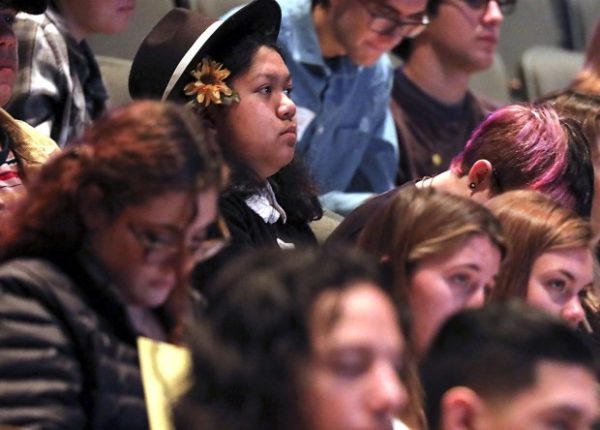APTOS — Asked if they planned to vote in upcoming elections, Soquel High School classmates and friends Javi Jenkins, Ben Donaldson and Hamilton Evans answered “yes” enthusiastically in unison Friday morning.
The trio, all 18 and Model United Nations members, were among the several hundred Santa Cruz County high school juniors and seniors from 16 schools attending the 2020 Civics Forum at Cabrillo College. The event, the second since its launch by the Democratic Central Committee of Santa Cruz County in 2017, featured 19 elected officials ranging from local judges and the sheriff to state assemblymen and everything in between.

Emcee Santa Cruz County Supervisor Ryan Coonerty launched the event by telling attendees that the day’s event was meant to push back on the idea that politicians do not listen or care to any but their wealthy donors.
“It is your voice that can not only shape national politics but also shape local politics,” Coonerty said, relating a story from his time as Santa Cruz’s mayor, when a student lifeguard successfully lobbied him to install defibrillators in city facilities.
“Each of you are experts in your community. To the extent that you can think of ways for your community to be better, let these folks know and let me know and we’ll be happy to pursue it,” Coonerty said. “You’re our eyes and ears, you have a perspective that we often don’t hear in our meetings and it’s important that your voice be heard.”
City politics
After one of the day’s first “breakout sessions” with council members from each of the county’s four cities, the teenagers reflected on answers each received to their questions. Jenkins asked if the elected officials believed psilocybin — psychoactive plants and fungi — should be decriminalized. Donaldson asked for their take on Santa Cruz city’s 2018 Measure M rent control ballot question, and what protections renters should have. Evans asked officials what “affordable housing” really means for their cities.
“It’s not often you get these people in front of you and they have to answer all your questions,” Jenkins said afterward. “Even if they didn’t always answer your questions. Like, I asked the question about psilocybin and all of a sudden they’re talking about community collaboration. Like, what was that? It was kind of like the classic, oh, let’s spin this into something less controversial.”
Legal perspective
In another session, featuring local District Attorney Jeff Rosell, Sheriff Jim Hart and Judges Syda Cogliati and John Salazar, students asked officials if anyone is beyond rehabilitation, about the county’s recidivism rates and drug arrests, the City of Santa Cruz’s ranking among high-crime areas about victim support services, among other questions.
Delta High School student Luella Baer, 17, asked Rosell about support resources his office provides victims, even if prosecutors cannot move forward in court. Rosell responded with a litany of victims’ services available, ranging from counseling and burial assistance to relocation assistance and new door locks.
Baer said afterward that she had family members who had been victims of violence and experienced “red tape” in getting assistance. Baer said she hopes to go into a career involving social work or psychology. The Civics Summit, she said, has been very informative.
“I actually think it’s been, I’m pleasantly surprised, honestly,” Baer said. “There’s a lot of higher-up people than I was expecting and basically everything I’ve wondered about or wanted to know has gone answered, which I really appreciated.”
San Lorenzo Valley High School students Steven Katawicz, who said after the session that he is interested in pursuing a career in politics, asked Hart whether or not he supported allowing properly trained civilians to carry firearms in public as protection in the face of mass shootings.
“I have the authority to issue carry-concealed permits, as every sheriff in the state does. I don’t believe more guns on the street brings any more community safety,” Hart responded. “So, I issue, I think I have 14 permits for a community of 275,000 people. Kern County has about 12,000, just to give you an example of how it varies. I’m not a strong believer in guns. I don’t think guns keep us safe. There’s so much data out there that you are 60% more likely to die of a gunshot wound if you have a gun in your own home.”
Between sessions, attendees were given the opportunity to pre-register to vote, to take part in a mock election based on questions their peers came up with and to get information on getting paid to work the polls for upcoming elections.
